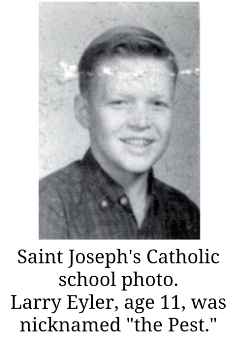
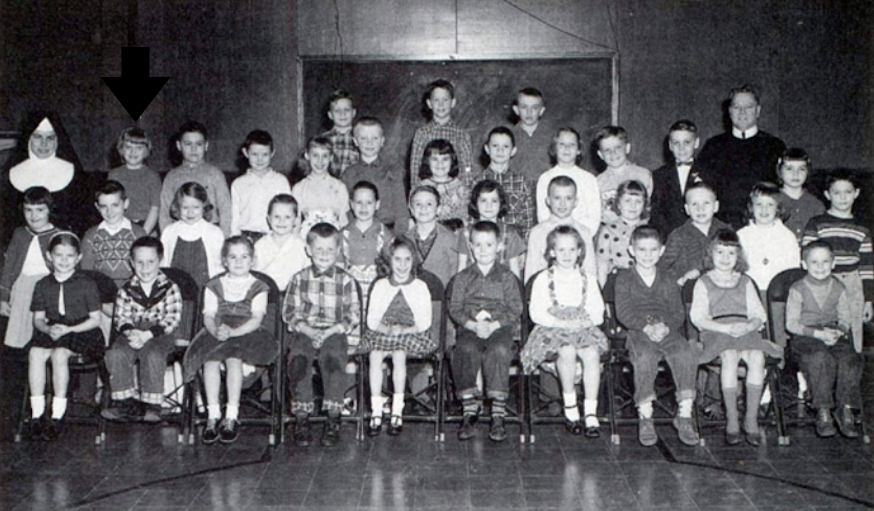
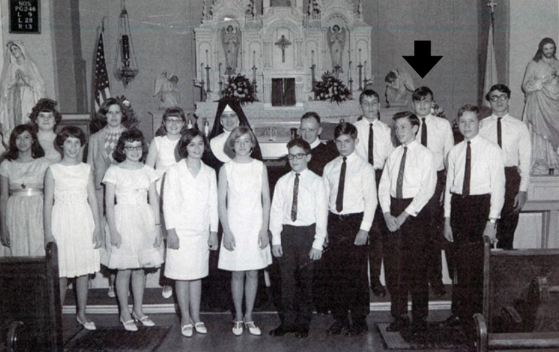

Eyler had a very close relationship with his sister Theresa Moell. She had helped get him his job at Andy’s Liquors, where she worked.
She said that her brother had been gay ever since he was a teenager. That was one of those things you just know; it piles up. She knew he liked bondage but said she didn’t know of any time he hurt someone.
Larry left college to work as a guard in the Indiana National Bank and spent six months as a Pinkerton guard in the Marion County General Hospital in Indianapolis. He also had jobs at a shoe store and a trucking company and spent a long period on welfare. Now he lived on odd jobs when they came available and he was in the mood for them.
Eyler had been a member of the YMCA since September 20th, 1982, which was while he and John Dobrovolskis kept an apartment at the Sovereign Hotel.
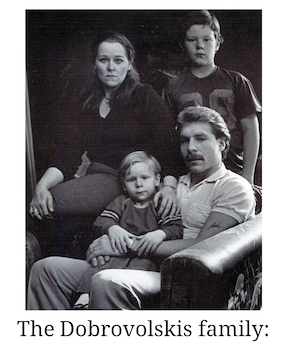
Despite his intelligence and muscular build, he seemed to have the maturity of a twelve-year-old and could be almost endearing.
Eyler liked to call his sexual partners names like ‘’bitch’’ and ‘’whore’’, as if they were women.
Eyler had a difficult time accepting his homosexuality. Eyler had a strange temper. (DID?)
At least three of the victims had traces of the ‘’hypnotic’’ prescription drug Placidly.
Eyler didn’t take drugs except for an occasional sleeping pill.
An acquaintance of Larry named Darl said: ‘’I work for the government. I can’t tell you what I do, but I work for the government.’’
The Indiana task force received a tip on its hotline that Eyler had a suitcase in Terre Haute that he didn’t want anyone to know about.
Robert David Little told in court how he met Eyler at the university where he was the chairman of library science. That was in 1975. The professor said he had allowed Eyler and his friend James Williams to live with him rent-free. Williams left the next year, but Eyler remained. Little told of helping Eyler get the Sherwin Avenue apartment and of coming up from Terre Haute on Friday, August 17th, 1984.
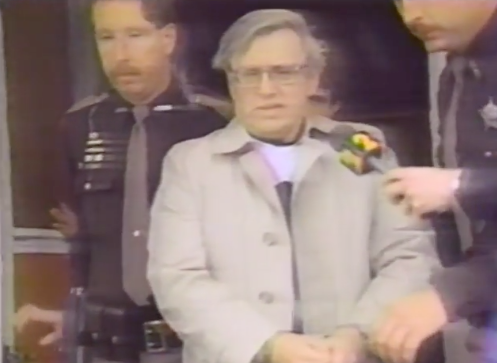
Larry stayed in a home in Greenview with a mutual friend, James Williams, a computer consultant.
Attorney David Schippers said that for a circumstantial evidence case ‘’the death penalty is never appropriate.’’ Standing in court behind Eyler, he added, ‘’Some day, somewhere, God willing, we may find we were wrong. We may find that the jury was wrong and that Larry Eyler is not the murderer of Danny Bridges. And Judge, what then?’’
‘’Although there is a strong possibility that Mr. Little killed Danny Bridges, Mr. Eyler was wrongly convicted (only) because of the gruesome disposal of the body, and Mr. Little’s carefully staged claim of innocence.’’
The appeal mentioned that Little’s car had not been dusted for fingerprints and that his alibi of returning to Indiana at the time Danny was killed had not been corroborated.
‘’Little was in a position to intimidate Eyler and expect Eyler to cover up the crime,’’ the appeal continued, because Eyler had been financially dependent on him and also would have been the immediate suspect if the body were found.
‘’As horrible as it may be to try to conceal a murder by cutting up a body, it does not prove Mr. Eyler guilty of murder beyond a reasonable doubt when the wholly circumstantial evidence points to the very real possibility that Mr. Little may be responsible for the murder.’’



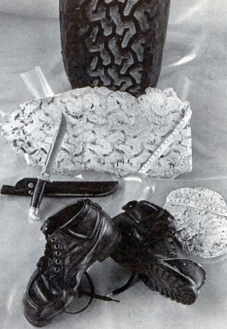
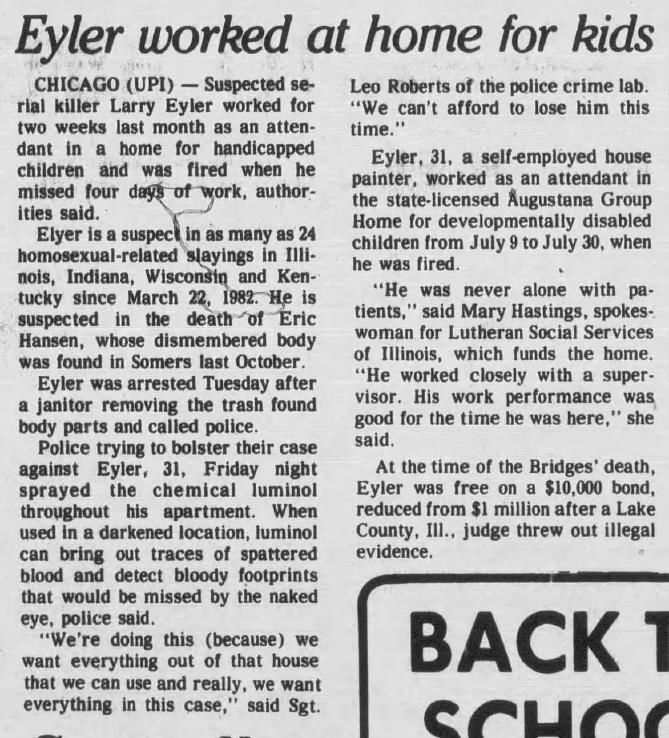
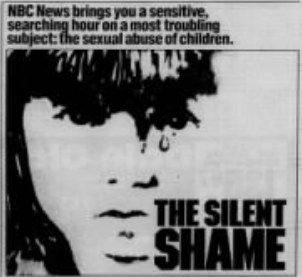
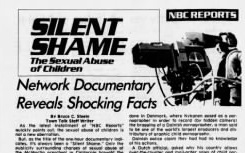
Ever since September 1982, local NBC television producer Chuck Collins had been working with reporter Mark Nykanen in putting together a network special on child pornography and prostitution. The story took them to several parts of the country and Denmark, but much of the footage was filmed in Chicago. The city does not have a notorious district such as Sunset Strip, but in the 1970s it had a computerized ring that sold boys to customers in other states. The operation was called the ‘’Chicken Delight Escort Service.’’ One druggist on the North Side always used boys to ‘’deliver medicine’’ to plush high rises on North Lake Shore Drive, the address of respected doctors and lawyers. The NBC project was not one of those rush-in, rush-out jobs that local stations would do in advance of a ratings survey. Night after night the crew spent hours on stakeouts and following the police on raids, even though most of the work would be edited out.
NBC News Reports: Silent Shame (August 25, 1984)
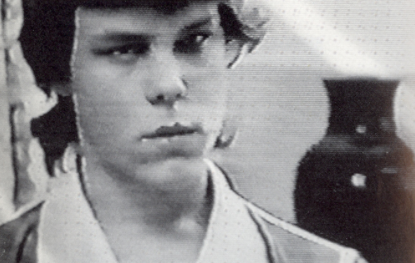
Danny Bridges (a police informer) was about to become the best-known teenager in Chicago through the interviews. His would be the voice of all runaways, the unwanted trying to make do in a world that wasn’t made for them. Danny was just a small part of the ‘’Silent Shame’’ TV news investigation. The crew had a lot of work left before the documentary would be shown nationally in late August.
The crew filmed a business executive who boasted of all the little girls he had sex with. Photos of the girls were framed and neatly arranged on the wall over the couch, like hunting trophies. He kept their underwear in a locked closet.
(Source: Freed to Kill: The True Story of Larry Eyler by author Gera-Lind Kolarik)










(Chicago_Tribune_Wed__Mar_9__1994)